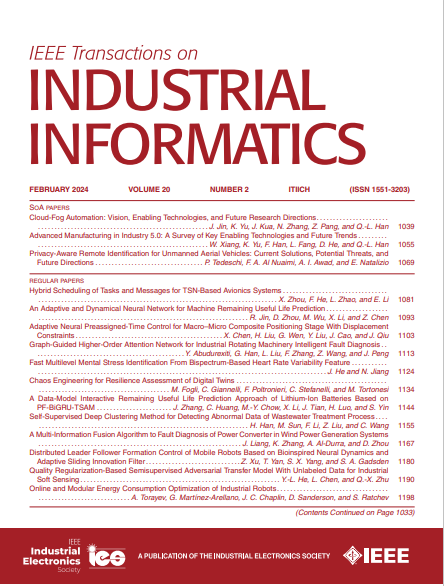具有正式质量保证的工业规模控制系统的仿真设计
IF 9.9
1区 计算机科学
Q1 AUTOMATION & CONTROL SYSTEMS
引用次数: 0
摘要
现实的工业系统通常需要建模为由数百(很容易数千)个非线性微分代数方程(dae)组成的混合系统。这种模型的大小是开发工业控制系统自动化设计方法时需要克服的主要障碍之一。在本文中,我们提出了一种基于场景的方法,通过利用仿真、黑盒优化和统计模型检查之间的协同作用,使我们能够自动设计有质量保证的工业规模的控制系统,即,用户指定的对正确性的统计保证在可能的操作场景中保持的控制系统。我们通过一个包含1276个方程的混合非线性DAE系统的Modelica模型(其中492个是非平凡方程,包含152个连续状态变量和38个离散状态变量)以及7个算法块来证明我们方法的有效性。我们的实验表明,在一个现成的工作站几个小时的计算中,我们可以找到有质量保证的解决方案(质量保证非常严格)来解决我们的设计问题。我们还计算了一个完整的离散帕累托前线为这样一个大系统在两个相互冲突的关键性能指标。本文章由计算机程序翻译,如有差异,请以英文原文为准。
Simulation-Based Design of Industry-Size Control Systems With Formal Quality Guarantees
Realistic industrial systems typically need to be modeled as hybrid systems consisting of hundreds (easily thousands) of nonlinear differential algebraic equations (DAEs). The size of such models is one of the major obstacles to overcome when developing automated design methods for industrial control systems. In this article, we present a scenario-based approach that, by exploiting the synergies among simulation, black-box optimization, and statistical model checking, allows us to automate the design of quality-guaranteed industry-size control systems, i.e., control systems for which a user-specified statistical guarantee on correctness holds over the possible operational scenarios. We show the effectiveness of our approach through a Modelica model consisting of a hybrid nonlinear DAE system with 1276 equations, 492 of which are nontrivial, containing 152 continuous state variables and 38 discrete ones, plus 7 algorithm blocks. Our experiments show that within a few hours of computation on an off-the-shelf workstation, we can find quality-guaranteed solutions (with very tight quality guarantees) to our design problem. We also compute an entire discretized Pareto front for such a large system over two conflicting key performance indicators.
求助全文
通过发布文献求助,成功后即可免费获取论文全文。
去求助
来源期刊

IEEE Transactions on Industrial Informatics
工程技术-工程:工业
CiteScore
24.10
自引率
8.90%
发文量
1202
审稿时长
5.1 months
期刊介绍:
The IEEE Transactions on Industrial Informatics is a multidisciplinary journal dedicated to publishing technical papers that connect theory with practical applications of informatics in industrial settings. It focuses on the utilization of information in intelligent, distributed, and agile industrial automation and control systems. The scope includes topics such as knowledge-based and AI-enhanced automation, intelligent computer control systems, flexible and collaborative manufacturing, industrial informatics in software-defined vehicles and robotics, computer vision, industrial cyber-physical and industrial IoT systems, real-time and networked embedded systems, security in industrial processes, industrial communications, systems interoperability, and human-machine interaction.
 求助内容:
求助内容: 应助结果提醒方式:
应助结果提醒方式:


